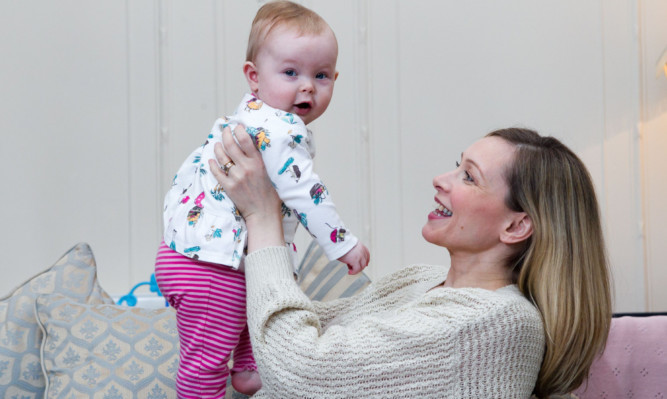
The little girl who’s been genetically engineered to help beat Huntington’s disease.
She’s a gurgling picture of health and the apple of her parents’ eyes. But adorable seven-month-old Amelia Queen is a baby with a difference she was genetically engineered in a laboratory to help beat an incurable disease which has blighted her family,
Amelia’s birth is believed to be a Scottish medical first and one which will eradicate devastating Huntington’s disease from not only the newborn but from future generations of her family.
Mum Juliana, 37, inherited Huntington’s from dad Jacky, 59.
She’s watched helplessly as his condition which causes dementia and tremors slowly takes him over.
After discovering she had a 50% chance of passing the terminal condition on to her children, Juliana and husband Graham, 50, a lawyer, applied to take part in pioneering genetic screening treatment at Edinburgh Royal Infirmary.
They were ecstatic when they discovered they’d been chosen to take part. But it has been a journey punctuated with anxiety and grief.
They lost their first baby, a crushing experience so raw only parents that have been through such a loss can understand it, at the very outset.
But they were “determined to carry on” and found themselves subjected to radical treatment.
The technique they went through known as pre-implantation genetic diagnosis (PGD) involved Juliana having her eggs fertilised and the Huntington’s-free ones selected and frozen ahead of conventional IVF treatment.
“It took 18 months from retrieving the embryos, selecting healthy ones and then undergoing IVF to become pregnant,” said Juliana. The embryo which became Amelia was kept in liquid nitrogen in cold storage. She was “a back-up” option, revealed Julia. And one that was needed after the first pregnancy ended in tragedy.
“I can only hope my determination for a healthy baby gives other women in my position hope to do the same,” she added. “The way forward is not to bury your head in the sand but to drive hard for research and breakthroughs.”
Now cuddling her baby at home in Newlands, Glasgow, the former estate agent turned charity volunteer is consumed with love and delighted she went through with the ground-breaking treatment.
“We are happy beyond belief,” Juliana said hugging her bundle of fun. “Doctors have managed to prevent the gene from being passed down. A new generation of children can be born free of something which has affected my family for so long. Without this amazing technique I would never have gone ahead and had a child. We cannot thank the doctors enough for all the wonderful research and work which has gone into making this possible.”

As a busy new mum she doesn’t have time to dwell on what her future holds as a carrier. But she knows from caring for dad Jacky what symptoms to look out for.
“I just want to enjoy those precious years of motherhood and pray for a breakthrough treatment for Huntington’s patients,” she added.
Dad Graham, 50, is overjoyed. “We feel amazingly lucky to have Amelia. Juliana has been amazingly brave to endure all that it took to have our baby. “I feel like the luckiest guy in the world,” he added. “We just hope for a breakthrough for Juliana.”
Juliana’s specialist, Dr Mary Porteous, clinical geneticist at Edinburgh Royal Infirmary, is amazed herself how far genetic science has come. She confirmed Amelia is the unit’s first baby and the first to be born to the technique.
She said: “I have amazing respect for parents who endure all the medical intervention to have a healthy baby. From 15 to 20 eggs we produced two to three healthy embryos. One is used and the other is stored well below -70C in case the first pregnancy is not sustained. We have managed to produce a handful of healthy pregnancies which potentially break the hold Huntington’s has had over their families for generations. Sadly, not all result in successful pregnancies, but for those who achieve a healthy baby the joy is immense.
Tiny Amelia is one of the first babies in the world to have been born after genetic screening for Huntington’s. The fledgling science is mired in ethical debate. Many at present feel it is unfair only stable couples with no children are considered for the treatment.
John Eden, chief executive of the Scottish Huntington’s Association, agreed that we’re at the dawn of a new age in treatment but said: “We welcome this wonderful breakthrough. It is a huge journey for couples, but it is utterly inequitable that those with one child are excluded.”
Juliana who would never have had a child without the treatment is clear of why she has chosen to speak exclusively about the technique to The Sunday Post.
“I am telling my story to raise the profile of Huntington’s and tell other parents that there is now hope of releasing their children from inheriting the gene.”
Huntington’s disease
Huntington’s disease is a progressive neuro-psychiatric disorder. It is hereditary. Every child born to a parent carrying the Huntington’s gene has a 50% risk of inheriting the gene. Huntington’s disease affects men and women. The onset of symptoms usually occurs between the ages of 30 and 55, although people have been known to develop the illness later in life. There are between 6,000 and 10,000 sufferers in the UK. Huntington’s disease causes a steady decline of a sufferer’s physical, emotional and cognitive skills There is no cure it is terminal. But the Huntington’s Disease Association offers regional care advisers who can provide support. Scots and those living in the north of England are much more likely to have the condition.

Enjoy the convenience of having The Sunday Post delivered as a digital ePaper straight to your smartphone, tablet or computer.
Subscribe for only £5.49 a month and enjoy all the benefits of the printed paper as a digital replica.
Subscribe